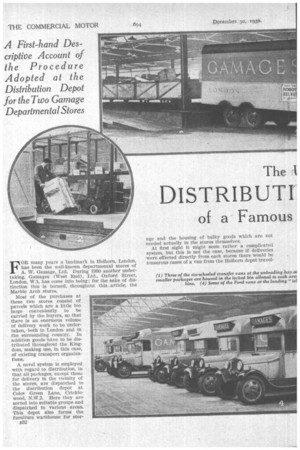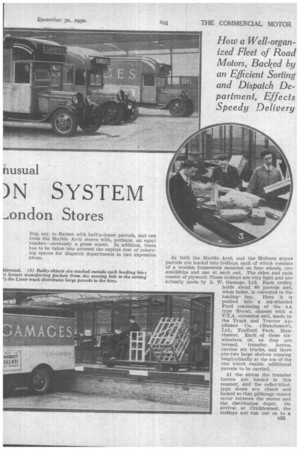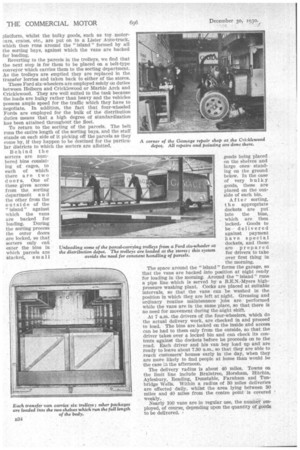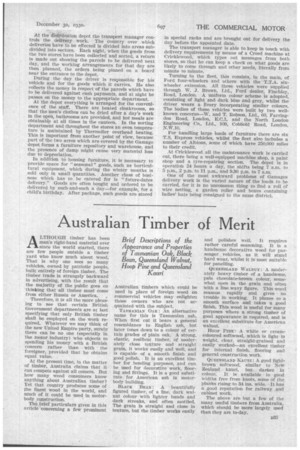The
Page 46

Page 47

Page 48

Page 49

If you've noticed an error in this article please click here to report it so we can fix it.
DISTRIBUTI
)N SYSTEM
of a Famous ondon Stores
A First-hand Des criptive Account of the Procedure Adopted at the Distribution Depot for the Two Gamage Departmental Stores How a Well-organ ized Fleet of Road Motors, Backed by an Efficient Sorting and Dispatch De partment, Effects Speedy Delivery
FOR many years a landmark in Holborn, London, has been the well-known departmental stores of A. W. Gamage,. Ltd. During 1930 another undertaking, Gamages (West End), Ltd., Oxford Street, London, W.1, has come into being; for the sake of distinction this is termed, throughout this ,article, the Marble Arch stores.
Most of the purchases at these two stores consist of parcels which are a little too large conveniently to be carried by the buyers, so that
there is an enormous volume of delivery work to be 'undertaken,, both in London and in the surrounding country. In addition goods have to be distributed throughout the Kingdom, making use, in this case, of existing transport organizations.
A novel system is employed with regard to distribution, in that all packages, except those for delivery in the vicinity of the stores, are dispatched to the . distribution depot at Coles Green Lane, Cricklewood, N.W.2. Here they are sorted into suitable groups and dispatched to various areas. This depot also forms the furniture warehouse for stor B32 age and the housing of bulky goods which are not needed actually in the stores themselves.
At first sight it might seem rather a complicated system, but this is not the case, because if deliveries were effected directly from each stores there would be numerous cases of a van from the Holborn depot travel ling, say, to Barnet with half-a-dozen parcels, and one from the Marble Arch stores with, perhaps, an equal number—obviously a gross waste. In addition, there has to be taken into account the capital cost of reServing spaces for dispatch departments in two expensive areas.
At both the Marble Arch and the Holborn stores parcels are loaded into trolleys, each of which consists of a wooden framework mounted on four wheels, two amidships and one at each end, The sides and ends consist of plywood_ These trolleys are very light and are actually made by A. W. Gamag-e, Ltd. Each trolley holds about 40 parcels and, when laden, is conveyed to the loading bay. Here it is pushed into a six-wheeled Ford consisting of the AA type 30-cwt. chassis with a T.T.A. extension unit, made by the Truck and Tractor Appliance Co. (Manchester), Ltd., Trafford Park, Manchester. _Each of these sixwheelers, or, as they are termed, transfer_ lorries, carries six trucks, and there are, two large shelves running longitudinally at the top of the van which enable additional parcels to be carried. •
At • the stores the transfer lorries are loaded in this manner, and the roller-blindtype doors are closed and locked so that pilferage cannot occur between the stores and the distribution depot. On
arrival at Cricklewood, the trolleys are run out on to a
platform, whilst the bulky goods, such as toy motorcars, crates, etc., are put on to a Lister Auto-truck, which then runs around the " island " formed by all the sorting bays, against which the vans are backed for loading.
Reverting to the parcels in the trolleys, we find that the next step is for them to be placed on a belt-type conveyor which carries them to the sorting department. As the trolleys are emptied they are replaced in the transfer lorries and taken back to either of the stores.
These Ford six-wheelers are employed solely on duties between Holborn and Cricklewood or Marble Arch and Cricklewood. They are well suited to the task because the loads are bulky rather than heavy and the vehicles possess ample speed for the traffic which they have to negotiate. In addition, the fact that four-wheeled Fords are employed for the bulk of the distribution duties means that a high degree of standardization has been attained throughout the fleet.
To return to the sorting of the parcels. The belt runs the entire length of the sorting bays, and the staff stands on each side of it picking off the parcels as they come by, if they happen to be destined for the particular districts to which the sorters are allotted.
Behind the sorters are numbered bins consisting of cages, to each of which there are two doors. One of these gives access from the sorting department a n d the other from the outside of the " island " against which the vans are backed for loading. During the sorting process the outer doors are locked, so that sorters only can
enter the bins in Unloading some of the parcel-carrying which parcels are the distribution depot. The trolleys ar stacked, s m a 11 avoids the need for consta
goods being placed on the shelves and large ones standing on the ground below. In the case of very bulky goods, these are placed on the outside of each bin.
After sorting, t h e appropriate dockets are put into the bins, which are then locked. Goods to be delivered against payment have special dockets, and these are prepared for drivers to take over first thing in the morning.
The space around the " island " forms the garage, so that the vans are backed into position at night ready for loading in the morning. Around the " island " runs a pipe line which is served by a B.E.N.-Myers highpressure washing plant. Cocks are placed at suitable intervals, so that the vans can be washed in the position in which they are left at night. Greasing and ordinary Tontine maintenance jobs are performed while the vans are in the same place, so that there no need for movement during the night shift.
At 7 a.m. the drivers of the four-wheelers, which do the actual delivery work, are checked in and proceed to load. The bins are locked on the inside and access can be had to them only from the outside, so that the driver takes over a locked bin and can check its contents against the dockets before he proceeds on to the road. Each driver and his van boy load up and are ready to leave about 7.30 a.m., so that they are able to reach customers' houses early in the day, when they are more likely to find people at home than would be the case in the afternoon.
The delivery radius is about 40 miles. Towns on the limit line include Braintree, Horsham, Hitchin, Aylesbury, Reading, Dunstable, Farnham and Tunbridge Wells. Within a radius of 30 miles deliveries are effected daily, whilst the area lying between 30 miles and 40 miles from the centre point is covered weekly.
Nearly 100 vans are in regular use, the number employed, of course, depending upon the quantity of goods to be delivered.
At the distribution depot the transport manager controls the delivery work. The country over _which deliveries, have to be effected is divided into areas subdivided into sectors. Each night, when the goods from the two stores have been collected and sorted, a return is made out showing the parcels to be delivered next day, and the working arrangements for that day are then planned, the orders being pinned on a board near the entrance to the depot.
During the day the driver is responsible for his vehicle and for the goods which it carries. He also collects the money in respect of the parcels which have to be delivered against cash payments, and at night he passes on the money to the appropriate department.
At the depot everything is arranged for the convenience of the staff. There are heated cloakrooms, so that the men's clothes can be dried after a day's work in the open, bathrooms are provided, and hot meals are obtainable at all times in the canteen. In the sorting department and throughout the stores an even.temperature is maintained by Thermolier overhead heating. This is important from another point of view, because part of the two acres which are covered by the Gainage depot forms a furniture repository and warehouse, and the presence of damp might cause very material loss due to depreciation.
In addition to housing furniture, it is necessary to provide space for " seasonal " goods, such as horticultural equipment, which during the winter months is sold only in small quantities. Another class of business which has to be catered for is "future-dates delivery." Goods are often bought and ordered to be delivered by such-and-such a day—for example, for a child's birthday. After package, such goods are stored in special racks and are brought out for delivery the day before the appointed date.
The transport manager is able to keep in touch with delivery requirements by means of a Creed machine at Cricklewood, which types out messages from both stores, so that he can keep a check on what goods are likely to come through and other needs, literally from minute to minute.
Turning to the fleet, this consists, in the main, of Ford four-wheelers and others with the -T.T.A. sixwheeler extension. All these vehicles were supplied . through W. J. Brown, Ltd., Ford dealer, Pinchley, Road, London. A. uniform colour scheme is adopted, consisting of light and dark blue and grey, whilst the driver wears a• livery incorporating similar colours. The bodies of these vehicles were built by two wellknown concerns—W. and T. Robson, Ltd., 60, Earringdon Road, London, E.C.1, and the North London Engineering Co., Ltd., 109, Cobbold Road, London, N.W.10.
For handling large loads of furniture there are six T.S. Express vehicles, whilst the fleet also includes a number of Albions, some of which have 250,000 miles to their credit.
At Cricklewood all the maintenance work is carried out, there being a well-equipped machine shop, a paint shop and a tyre-repairing section. The depot is in operation 24 hours a day, the shifts being 7 a.m. to 5 p.m., 2 p.m. to 11 p.m., and 9.30 p.m. to 7 a.m.
One of the most awkward problems of Gamages delivery work is the varied nature of the loads to be carried, for it is no uncommon thing to find a roll of wire netting, a garden roller and boxes containing ladies' hats being consigned to the same district.




























































































